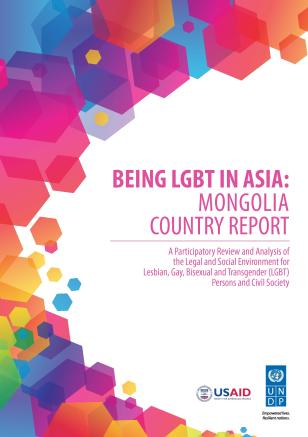Being LGBT in Asia: Mongolia Country Report
Being LGBT in Asia: Mongolia Country Report
October 21, 2014
This report reviews the legal and social environment faced by lesbian, gay, bisexual and transgender (LGBT) people in Mongolia. It is a product of the Mongolia National LGBT Community Dialogue held on 20–21 March 2014 in Ulaanbaatar as well as a desk review and interviews conducted by the report writers. The National Dialogue brought together a total of 140 participants including LGBT community members and activists, representatives of civil society organizations, human rights experts, UN agencies, the Government of Mongolia and development partners.
The Mongolia National Dialogue upon which the report is based was organized by the United Nations Development Programme (UNDP) in partnership with the United States Agency for International Development (USAID). The work is a product of a broader initiative entitled ‘Being LGBT in Asia: A Participatory Review and Analysis of the Legal and Social Environment for Lesbian, Gay, Bisexual and Transgender (LGBT) Persons and Civil Society.’ Launched on Human Rights Day, 10 December 2012, ‘Being LGBT in Asia’ is a first-of-its-kind Asia-wide learning effort undertaken with Asian grassroots LGBT organizations and community leaders alongside UNDP and USAID. With a focus on eight priority countries – Cambodia, China, Indonesia, Mongolia, Nepal, the Philippines, Thailand and Viet Nam – the effort examines LGBT lived experiences from a development and rights perspective.
‘Being LGBT in Asia’ has a number of objectives. It encourages networking between LGBT people across the region, building a knowledge baseline and developing an understanding of the capacity of LGBT organizations to engage in policy dialogue and community mobilization. Through this work, ‘Being LGBT in Asia’ promotes understanding of the inherent human rights of LGBT people and a regional understanding of the stigma and discrimination they face. It also outlines steps toward LGBT-inclusive development work for UNDP and the UN system; USAID and the US Government; and other development partners through research like this report and other social and multimedia products. Finally, the initiative highlights the views generated by LGBT participants at community dialogues, linking stakeholders who are working to enhance LGBT human rights across Asia.

 Locations
Locations